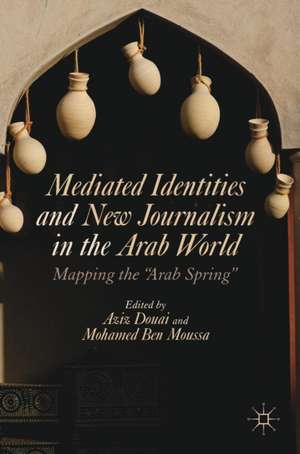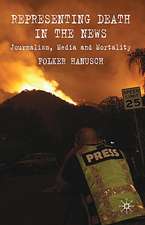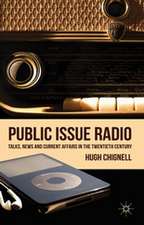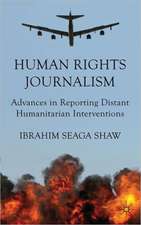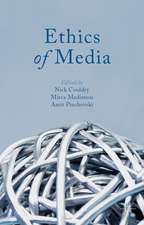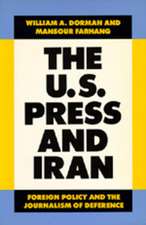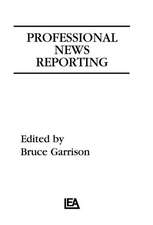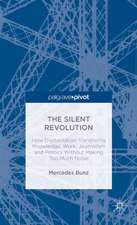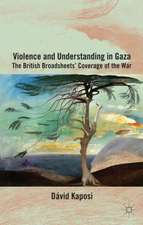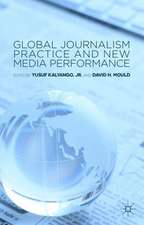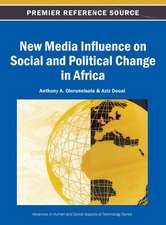Mediated Identities and New Journalism in the Arab World: Mapping the "Arab Spring"
Editat de Aziz Douai, Mohamed Ben Moussaen Limba Engleză Hardback – 22 noi 2016
This book looks into the role played by mediated communication, particularly new and social media, in shaping various forms of struggles around power, identity and religion at a time when the Arab world is going through an unprecedented period of turmoil and upheaval. The book provides unique and multifocal perspectives on how new forms of communication remain at the centre of historical transformations in the region.
The key focus of this book is not to ascertain the extent to which new communication technologies have generated the Arab spring or led to its aftermaths, but instead question how we can better understand many types of articulations between communication technologies, on the one hand, and forms of resistance, collective action, and modes of expression that have contributed to the recent uprisings and continue to shape the social and political upheavals in the region on the other. The book presents original perspectives and rigorous analysis by specialists and academics from around the world that will certainly enrich the debate around major issues raised by recent historical events.
Preț: 639.73 lei
Preț vechi: 752.63 lei
-15% Nou
Puncte Express: 960
Preț estimativ în valută:
122.41€ • 128.07$ • 101.69£
122.41€ • 128.07$ • 101.69£
Carte tipărită la comandă
Livrare economică 03-17 aprilie
Preluare comenzi: 021 569.72.76
Specificații
ISBN-13: 9781137581402
ISBN-10: 1137581409
Pagini: 236
Ilustrații: XIII, 214 p. 3 illus.
Dimensiuni: 148 x 210 x 2 mm
Greutate: 0.4 kg
Ediția:1st ed. 2017
Editura: Palgrave Macmillan UK
Colecția Palgrave Macmillan
Locul publicării:London, United Kingdom
ISBN-10: 1137581409
Pagini: 236
Ilustrații: XIII, 214 p. 3 illus.
Dimensiuni: 148 x 210 x 2 mm
Greutate: 0.4 kg
Ediția:1st ed. 2017
Editura: Palgrave Macmillan UK
Colecția Palgrave Macmillan
Locul publicării:London, United Kingdom
Cuprins
Preface.- Part I: Mediated Identities and “Arab Spring” Politics.- 1.Beyond the Technology Debate: A General Introduction. Mohamed Ben Moussa.- 2.Social Media, Global Communications and the Arab Spring: Cross-level and Cross-Media Story Flows. Joo-Young Jung.- 3.New Media and Public Will Mobilization in the Tunisian and Egyptian Revolutions. Sahar Khamis and Kathy Vaughn.- 4.Islamists and New Media: The Muslim Brotherhood Digital Presence in English. Eid Mohamed and Emad Mohamed.- 5.Against all Odds: Defining a Revolutionary Identity in Syria. Naomí Ramírez Díaz.- Part II: New Media Journalism and Political Change.- 6.25 TV: A Case Study of the Media during the Egyptian Uprising. Chris Harper.- 7.Journalistic Transparency in Egypt and the UAE: Parallels between the Phenomena of the “Arab Spring” and the Demand of Web-based Transparency Tools. Andreas Sträter.- 8.Mapping the “Arab Spring”: A Framing Analysis of Egyptian TV News Coverage of July 3, 2013, the Day of the Ouster of President Mohamed Morsi. Mohamad H. Elmasry, Philip J. Auter and Heidi Makady.- 9.The 2011 Popular Protests in the Sultanate of Oman. Ahmed Al-Rawi.- 10.Network Journalism and the Egyptian Revolution: Can it Build Democratic Capacity? Ahmed El Gody.- 11.The Mediated “Arab Spring” Foretold: Conclusion. Aziz Douai
Recenzii
“Mediated Identities and New Journalism in the Arab World: Mapping the “Arab Spring,” edited by Aziz Douai and Mohamed Ben Moussa, sheds light on the role played by mediated communication, especially new and social media … . Scholars, researchers, students, media workers, and policy makers, who are interested in new ICTs and new journalism, particularly in the Arab world, will find insights in this volume.” (Tingting Hu, Journalism & Mass Communication Quarterly, (1-2), 2018)
Notă biografică
Aziz Douai is Associate Professor of Communication and Digital Media at the University of Ontario Institute of Technology, Canada. His research focuses on communication technologies, politics, and social change.
Mohamed Ben Moussa is Acting Dean of the School of Communication and Media Studies at the Canadian University Dubai, UAE. In addition to contributing to several edited books, his publications have appeared in Applied Journalism & Media Studies, Westminster Papers in Communication & Culture, Arab Media & Society, Canadian Journal of Communication, among others.
Textul de pe ultima copertă
This book looks into the role played by mediated communication, particularly new and social media, in shaping various forms of struggles around power, identity and religion at a time when the Arab world is going through an unprecedented period of turmoil and upheaval. The book provides unique and multifocal perspectives on how new forms of communication remain at the centre of historical transformations in the region.
The key focus of this book is not to ascertain the extent to which new communication technologies have generated the Arab spring or led to its aftermaths, but instead question how we can better understand many types of articulations between communication technologies, on the one hand, and forms of resistance, collective action, and modes of expression that have contributed to the recent uprisings and continue to shape the social and political upheavals in the region on the other. The book presents original perspectives and rigorous analysis by specialists and academics from around the world that will certainly enrich the debate around major issues raised by recent historical events.
Caracteristici
Timely study during the continuation of political upheaval in the Arab world since 2011 Original focus on issues and subjects little explored by other books Diverse range of contributors from North America, Europe, Arab countries, Japan, with diverse expertise from both academic and media practitioners
